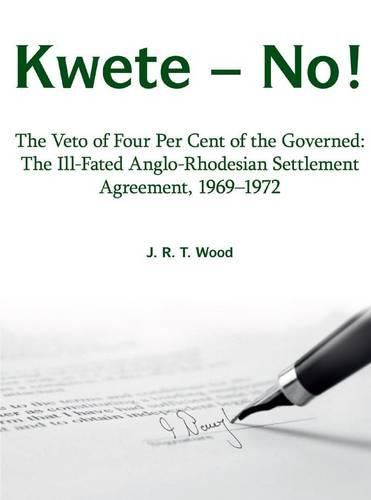Readings Newsletter
Become a Readings Member to make your shopping experience even easier.
Sign in or sign up for free!
You’re not far away from qualifying for FREE standard shipping within Australia
You’ve qualified for FREE standard shipping within Australia
The cart is loading…






The 1969 republican constitution of the Rhodesia was intended to secure recognition for Ian Smith’s 1965 UDI. Given the evasion by significant nations of the trade sanctions imposed by the UN, the gamble was that this de facto recognition would become de jure. But it was unlikely because the framers of the 1969 constitution rejected the aim of progress to majority rule through a qualified franchise. They offered the Africans only the goal of parity of racial representation. The common roll was replaced by a separate African roll and a ‘European’ one which included the Asian and coloured populations. The African ability to qualify for the vote was governed by the ratio of income tax they paid in comparison to the ‘Europeans’. In 1970 Ian Smith welcomed an overture from Edward Heath’s new conservative government to re-open the Anglo-Rhodesian negotiations. Lord Goodman succeeded in November 1972 to secure an agreed compromise, restoring the aim of eventual majority rule. The exiled nationalist insurgents’ efforts to ignite an armed insurgency were petering out by the time of the settlement. It therefore fell to the nationalists in Rhodesia, bent on majority rule, to stymie these effort. They succeeded because the British insisted that any settlement had to be endorsed by the majority of the people of Rhodesia. A referendum would mean a loss of face for Ian Smith. Lord Pearce’s judicial commission’s assessment insisted on ‘normal political activity’ forcing Smith to release a significant number of nationalist activists from detention. The leisurely formation of the commission gave these activists time to organize a campaign of rejection, the result of which the Pearce commission could not, or chose not, to ignore.
$9.00 standard shipping within Australia
FREE standard shipping within Australia for orders over $100.00
Express & International shipping calculated at checkout
The 1969 republican constitution of the Rhodesia was intended to secure recognition for Ian Smith’s 1965 UDI. Given the evasion by significant nations of the trade sanctions imposed by the UN, the gamble was that this de facto recognition would become de jure. But it was unlikely because the framers of the 1969 constitution rejected the aim of progress to majority rule through a qualified franchise. They offered the Africans only the goal of parity of racial representation. The common roll was replaced by a separate African roll and a ‘European’ one which included the Asian and coloured populations. The African ability to qualify for the vote was governed by the ratio of income tax they paid in comparison to the ‘Europeans’. In 1970 Ian Smith welcomed an overture from Edward Heath’s new conservative government to re-open the Anglo-Rhodesian negotiations. Lord Goodman succeeded in November 1972 to secure an agreed compromise, restoring the aim of eventual majority rule. The exiled nationalist insurgents’ efforts to ignite an armed insurgency were petering out by the time of the settlement. It therefore fell to the nationalists in Rhodesia, bent on majority rule, to stymie these effort. They succeeded because the British insisted that any settlement had to be endorsed by the majority of the people of Rhodesia. A referendum would mean a loss of face for Ian Smith. Lord Pearce’s judicial commission’s assessment insisted on ‘normal political activity’ forcing Smith to release a significant number of nationalist activists from detention. The leisurely formation of the commission gave these activists time to organize a campaign of rejection, the result of which the Pearce commission could not, or chose not, to ignore.